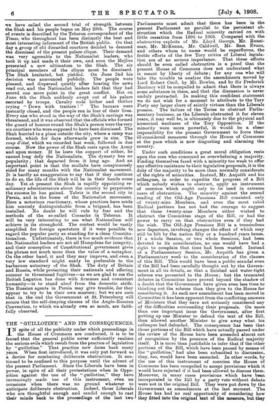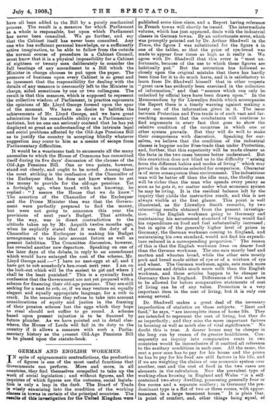THE " GUILLOTINE " AND ITS CONSEQUENCES.
IN spite of all the publicity under which proceedings in the House of Commons are conducted, it is to be feared that the general public never sufficiently realises the serious evils which result from the practice of legislation by "guillotine." That practice now dates back many years. When first introduced, it was only put forward as a device for combating deliberate obstruction. It con- tinued to be confined to this purpose until the advent of the present Parliament. Since the Liberals have been in power, in spite of all their protestations when in Oppo- sition against the use of the "guillotine," they have increasingly made use of this instrument, even on occasions when there was no ground whatever to anticipate deliberate obstruction. Indeed, those Liberals who are thoughtful enough and candid enough to cast their minds back to the proceedings of the last two Parliaments must admit that there has been in the present Parliament no parallel to the persistent ob. struction which the Radical minority carried on with little cessation from 1895 to 1905. Compared with the obstructive exploits of Mr. Lloyd George, Mr. Enact- man, Mr. McKenna, Mr. Caldwell, Mr. Sam Evans, and others whom to name would be superfluous, the feeble efforts of the few Tory critics of Liberal legisla- tion, are of no serious importance. That these efforts should be even called obstructive is a proof that the present House of Commons does not understand what is meant by liberty of debate ; for any one who will take the trouble to analyse the amendments moved by Lord Robert Cecil, by Mr. Bowles, and by Sir Frederick Banbury will be compelled to admit that there is always some substance in them, and that the discussion is never unduly protracted. In making this confident statement we do not wish for a moment to attribute to the Tory Party any larger share of saintly virtues than the Liberals possess. The failure of the Tories to obstruct Parlia- mentary business, as the Liberals obstructed it for eleven years, it may well be, is ultimately due to the physical and numerical weakness of the Tory Opposition. If the minority were more powerful, it would be a sheer impossibility for the present Government to force their ill-considered measures through the House of Commons at the pace which is now disgusting and alarming the country.
Under such conditions a great moral obligation rests upon the men who command so overwhelming a majority. Finding themselves faced with a minority too weak to offer any effective resistance to their legislative proposals, it is the duty of the majority to be more than normally considerate of the rights of minorities. Instead, Mr. Asquith and his colleagues, in order to expedite the progress of a Bill which nobody wishes to obstruct, apply an instrument of coercion which ought only to be used in extreme cases of obstruction. The minority against the second reading of the Old-Age Pensions Bill consisted only of twenty-nine Members, and even the, most rabid Radical partisan has not had the courage to suggest that these twenty-nine Members either wished to obstruct the Committee stage of the Bill, or had the power to carry on that obstruction even if they had the wish. The Old-Age Pensions Bill is a tremendous new departure, involving changes the effect of which may still be felt by the nation fifty or a hundred years hence. If a whole Session, or two whole Sessions, had been devoted to its consideration, no one would have had a right to complain that time had been wasted. Instead of a Parliamentary Session, Mr. Asquith has given a Parliamentary week to the consideration of the clauses of this Bill. This would have been a public scandal even if the Bill had been carefully thought out by the Govern- ment in all its details, so that a finished and water-tight scheme was presented to the House ; but the truncated debates in Committee have proved beyond the shadow of a doubt that the Government have given even less time to thinking out the scheme than they give to the House for considering it. As each new amendment has been moved in Coin initte:it has been apparent from the conflicting answers of Ministers that they have not seriously considered any of the difficulties surrounding their proposals. On more than one important issue the Government, after first putting up one Minister to defend the text of the Bill, then allowed another Minister to give away what his colleague had defended. The consequence has been that those portions of the Bill which have actually passed under the review of the House have been amended almost out of recognition by the pressure of the Radical majority itself. It is more than justifiable to infer that if the other portions of the Bill, which have been passed by means of the "guillotine," had also been submitted to discussion, they, too, would have been amended. In other words, by the use of this instrument of coercion the House of Commons has been compelled to accept provisions which it would have rejected if it had been allowed to discuss them. Moreover, in many cases provisions which have been incorporated in the Bill by a, party vote without debate were not in the original Bill. They were put down by the Government as amendments at the last moment. The House has had no real opportunity of considering how they fitted into the original text of the measure, but they have all been added to the Bill by a purely mechanical process. The result is a measure for which Parliament as a whole is responsible, but upon which Parliament has never been consulted. We go further, and say that the Cabinet itself has never been consulted. Any one who has sufficient personal knowledge, or a sufficiently active imagination, to be able to follow from the outside the normal course of procedure in a Cabinet Council, must know that it is a physical impossibility for a Cabinet of eighteen or twenty men deliberately to consider the full bearings of any amendment to a Bill which the Minister in charge chooses to put upon the paper. The pressure of business upon every Cabinet is so great and so incessant that the responsibility for dealing with the details of any measure is necessarily left to the Minister in charge, aided sometimes by one or two colleagues. The result is that this measure, which is supposed to represent the collective wisdom of Parliament, in practice represents the opinions of Mr. Lloyd George formed upon the spur of the moment. We have no desire to belittle the achievements of Mr. Lloyd George, and we have great admiration for his remarkable ability as a Parliamentary tactician, but no one can seriously contend that he has yet displayed so great an understanding of the intricate legal and social problems affected by the Old-Age Pensions Bill as to justify the country in accepting blindly whatever suggestion may occur to him as a means of escape from Parliamentary difficulties.
It would be a wearisome task to enumerate all the many anomalies to which the House of Commons has committed itself during its five days' discussion of the clauses of the Old-Age Pensions Bill. One or two points, however, stand out clearly, and ought to be noted. Among these the most striking is the confession of the Chancellor of the Exchequer that he does not know where to get the money to provide for the old-age pensions. Yet a fortnight ago, when taxed with not knowing, he replied : "I assure the House that we do know." The assertion of the Chancellor of the Exchequer and. the Prime Minister then was that the Govern- ment were perfectly prepared to find the money, but were not going to announce this year the provisions of next year's Budget. That attitude, by the way, was in direct contradiction to the attitude taken up by Mr. Asquith twelve months ago, when he explicitly stated that it was the duty of a Chancellor of the Exchequer in making his Budget arrangements to take into account future as well as present liabilities. The Committee discussion, however, has revealed another new departure. Speaking on one of the later days of the debate, in reply to an amendment which would have enlarged the cost of the scheme, Mr. Lloyd George said :—" I have no nest-eggs at all, and I have got to rob somebody's hen-roost next year. I am on the look-out which will be the easiest to get and where I shall be the least punished." This is a cynically frank confession that the Government are not yet prepared with a scheme for financing their old-age pensions. They are still seeking for a nest to rob, or, if we may venture on equally elegant and equally appropriate language, for a crib to crack. In the meantime they refuse to take into account considerations of equity and justice in the framing of their pension scheme lest the eggs which they hope to steal should not suffice to go round. A scheme based upon present injustice is to be financed by future plunder. As we have pointed out in detail else- where, the House of Lords will fail in its duty to the country if it allows a measure with such a Parlia- mentary history as the present Old-Age Pensions Bill to be placed upon the statute-book.



















































 Previous page
Previous page